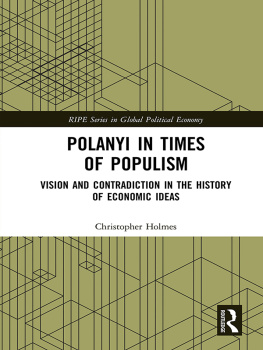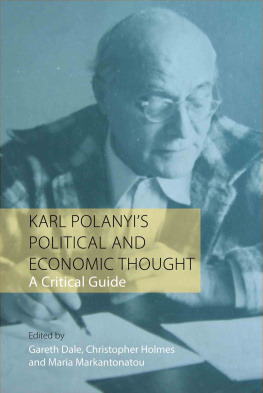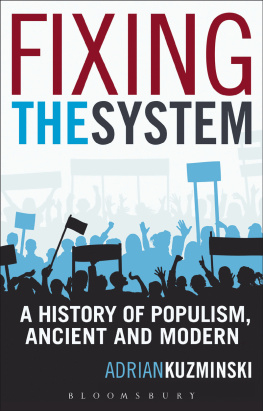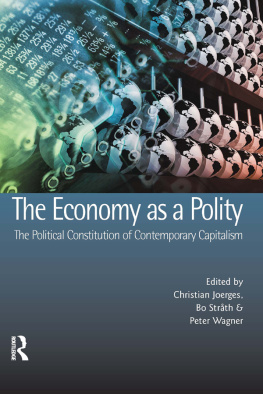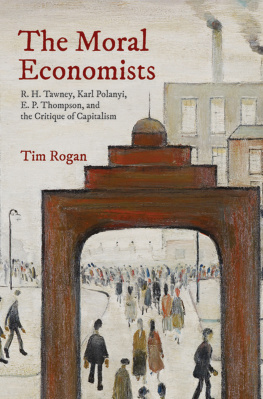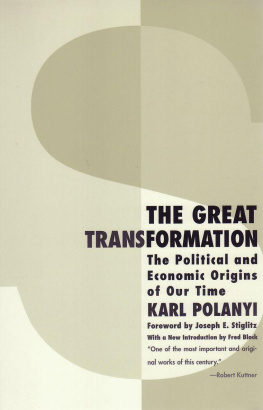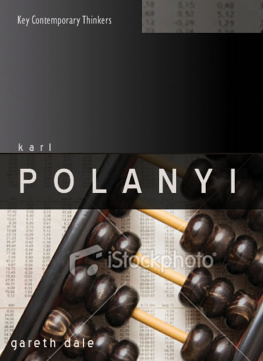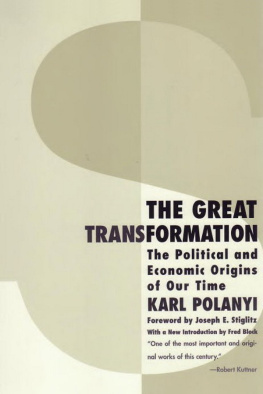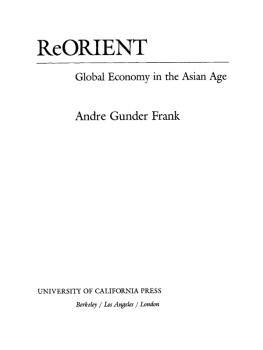Polanyi in Times of Populism
The rise of populism across Europe and the US first in the wake of the 2008 global financial crisis and then in the shape of Donald Trumps presidential campaign and the Brexit vote in 2016 are indicative of a seismic shift in the terrain of economic ideas in public discourse. Settled liberal norms concerning ever-increasing international market expansion, and the political integration required to sustain it, have been decisively upset by political forces that, whilst once on the fringes, now dominate economic debate. How might we make sense of this ideological breakdown and what might we hope for next?
This book turns to the work of Karl Polanyi for answers, developing the expansive, historicised approach to political economy that Polanyi pioneered. Holmes provides a wide-ranging history of economic ideas read in terms of a series of hopeful theoretical visions of order, in which political, social and ecological contradictions could be transcended in one way or another. Through this, the book demonstrates that the failing utopian visions of pre-2008 economic orthodoxy, which have formed the backdrop to the rise of populism today, are only the latest in a series that stretches across economic thought in Western modernity as a whole.
This book will interest students and scholars of international political economy, political science, sociology, anthropology, law and history.
Christopher Holmes is a Lecturer in Political Economy at Kings College, London. He works on various topics including the history of economic ideas, financial and monetary politics and alternatives to GDP in policymaking. He has published in a variety of leading journals including Economy and Society, New Political Economy, Review of International Political Economy and the British Journal of Politics and International Relations.
RIPE Series in Global Political Economy
Series Editors: James Brassett (University of Warwick, UK), Eleni Tsingou (Copenhagen Business School, Denmark) and Susanne Soederberg (Queens University, Canada)
The RIPE Series published by Routledge is an essential forum for cutting-edge scholarship in International Political Economy. The series brings together new and established scholars working in critical, cultural and constructivist political economy. Books in the RIPE Series typically combine an innovative contribution to theoretical debates with rigorous empirical analysis.
The RIPE Series seeks to cultivate:
Field-defining theoretical advances in International Political Economy
Novel treatments of key issue areas, both historical and contemporary, such as global finance, trade, and production
Analyses that explore the political economic dimensions of relatively neglected topics, such as the environment, gender relations, and migration
Accessible work that will inspire advanced undergraduates and graduate students in International Political Economy.
The RIPE Series in Global Political Economy aims to address the needs of students and teachers.
For more information about this series, please visit: www.routledge.com/RIPE-Series-in-Global-Political-Economy/book-series/RIPE
Securing Finance, Mobilizing Risk
Money Cultures at the Bank of England
John Hogan Morris
Affective Politics of the Global Event
Trauma and the Resilient Market Subject
James Brassett
Transnational Capital and Class Fractions
The Amsterdam School Perspective Reconsidered
Edited by Henk Overbeek and Bob Jessop
Polanyi in Times of Populism
Vision and Contradiction in the History of Economic Ideas
Christopher Holmes
First published 2018
by Routledge
2 Park Square, Milton Park, Abingdon, Oxon OX14 4RN
and by Routledge
711 Third Avenue, New York, NY 10017
Routledge is an imprint of the Taylor & Francis Group, an informa business
2018 Christopher Holmes
The right of Christopher Holmes to be identified as author of this work has been asserted by him in accordance with sections 77 and 78 of the Copyright, Designs and Patents Act 1988.
All rights reserved. No part of this book may be reprinted or reproduced or utilised in any form or by any electronic, mechanical, or other means, now known or hereafter invented, including photocopying and recording, or in any information storage or retrieval system, without permission in writing from the publishers.
Trademark notice: Product or corporate names may be trademarks or registered trademarks, and are used only for identification and explanation without intent to infringe.
British Library Cataloguing in Publication Data
A catalogue record for this book is available from the British Library
Library of Congress Cataloging in Publication Data
Names: Holmes, Christopher, 1983- author.
Title: Polanyi in times of populism : vision and contradiction in the history of economic ideas / Christopher Holmes.
Description: New York : Routledge, [2018] | Series: Ripe series in global political economy | Includes bibliographical references and index.
Identifiers: LCCN 2017050158| ISBN 9781138226708 (hardback) | ISBN 9781315396989 (e-book)
Subjects: LCSH: Polanyi, Karl, 18861964. | Economists-Hungary-Biography. | Economic policy-20th century. | Economic policy-21st century.
Classification: LCC HB102.P64 H65 2018 | DDC 330.15-dc23
LC record available at https://lccn.loc.gov/2017050158
ISBN: 9781138226708 (hbk)
ISBN: 9781315396989 (ebk)
for Edith
This book is the result of a decade of wrangling with Karl Polanyis ideas. Over this period, I have had the pleasure of working with a fascinating range of scholars, first at the Department of Politics and International Relations at the University of Southampton, then at the Department of Politics and International Studies at the University of Warwick and most recently at the European and International Studies Department at Kings College, London. I would therefore like to collectively thank my colleagues at these departments for providing consistently interesting, challenging and varied intellectual environments to think, talk and write in.
Beyond that, various individuals deserve special thanks. At the top of the list is Matthew Watson, who initially nurtured my interest in Polanyis work and the history of economic ideas more generally. His intellectual and moral support has been essential to me over the years and, without it, I would not have started on the path to writing this book in the first place. James Brassett also deserves special mention. I have always been able to talk about ideas completely freely with James, and that is a freedom I have relied on many times in thinking through the arguments developed here. I also thank the following people for their thoughts, comments, critique and encouragement at various points along the way: David Bailey, Fred Block, Ben Clift, Gareth Dale, Nancy Fraser, Colin Hay, David Owen, Lena Rethel, Ben Rosamond, Magnus Ryner, Len Seabrooke, Kate Weaver and David Yarrow. I also specially thank Chris Clarke for taking the time to read through an early draft and for making a variety of valuable suggestions for tightening things up. Needless to say, responsibility for contents remains solely mine.

